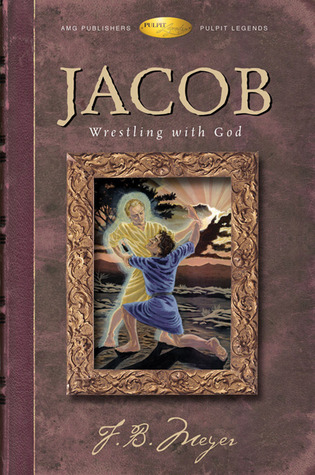Jacob: Wrestling with God
by F.B. Meyer
The story of Jacob's life portrays victories as well as failures. Jacob's journeys are some of the most intriguing life journeys in all of Scripture, for in these journeys Jacob experienced several revelations from God. Through these revelations Jacob learned to follow God--to hear His word and obey.With a conscious intention of breaking down the artificial walls of time and prestige, F. B. Meyer introduces us to the real man behind the mystique. He portrays Jacob as completely human--with the temptations, frailty and failures common to all of us. "The Bible," Meyer says, "does not hesitate to tell us the very worst about its heroes; that we may better magnify the grace of God...."In biographical style, Meyer's comforting words will help you discover the numerous passages of Scripture where God calls himself "the God of Jacob." The author seems to take speical delight in this paradoxical title, which links God's holy nature and protective strength with the frailties and weaknesses of Jacob and all mankind. After reading Jacob: Wrestling with GodJacob: Wrestling with God, you should have little doubt that God can do for all of us what He has done for Jacob if only we are willing to make a complete surrender to God and seek the fullness of His spirit.
Paperback, 144 pages
Published March 1st 2001 by AMG Publishers
© 2025 Bibleportal.com 版权所有.

F.B. Meyer (1847 - 1929)
A contemporary and friend of D. L. Moody and A. C. Dixon, was a Baptist pastor and evangelist in England involved in ministry and inner city mission work on both sides of the Atlantic. Author of numerous religious books and articles, many of which remain in print today, he was described in an obituary as The Archbishop of the Free Churches.Meyer was part of the Higher Life Movement and was known as a crusader against immorality. He preached against drunkenness and prostitution. He is said to have brought about the closing of hundreds of saloons and brothels. Meyer wrote over 40 books, including Christian biographies and devotional commentaries on the Bible. He, along with seven other clergymen, was also a signatory to the London Manifesto asserting that the Second Coming was imminent in 1918. His works include The Way Into the Holiest:, Expositions on the Epistle to the Hebrews (1893) ,The Secret of Guidance, Our Daily Homily and Christian Living.
Frederick Brotherton Meyer, a contemporary and friend of D. L. Moody was a Baptist pastor and evangelist in England involved in ministry and inner city mission work on both sides of the Atlantic. Author of numerous religious books and articles, many of which remain in print today, he has been described as The Archbishop of the Free Churches.
Meyer was part of the Higher Life movement and preached often at the Keswick Convention. He was known as a crusader against immorality. He preached against drunkenness and prostitution. He is said to have brought about the closing of hundreds of saloons and brothels.
F. B. Meyer wrote over 40 books, including Christian biographies and devotional commentaries on the Bible. He, along with seven other clergymen, was also a signatory to the London Manifesto asserting that the Second Coming was imminent in 1918.
Frederick Meyer spent the last few years of his life working as a pastor in England's churches, but still made trips to North America, including one he made at age 80 (his earlier evangelistic tours had included South Africa and Asia, as well as the United States and Canada ). A few days before his death, Meyer wrote the following words to a friend:
Meyer was a Baptist pastor and evangelist in England, born in London. He attended Brighton College and graduated from London University in 1869. He studied theology at Regents Park Baptist College.
Meyer began pastoring churches in 1870. His first pastorate was at Pembroke Baptist Chapel in Liverpool. In 1872 he pastored Priory Street Baptist Church in York. While he was there he met the American evangelist Dwight L. Moody, whom he introduced to other churches in England. The two preachers became lifelong friends.
In 1895 Meyer went to Christ Church in Lambeth. At the time only 100 people attended the church, but within two years over 2,000 were regularly attending. He stayed there for fifteen years, and then began a traveling to preach at conferences and evangelistic services.
His evangelistic tours included South Africa and Asia. He also visited the United States and Canada several times.
He spent the last few years of his life working as a pastor in England's churches, but still made trips to North America, including one he made at age 80.
Meyer was part of the Higher Life movement and preached often at the Keswick Convention. He was known as a crusader against immorality. He preached against drunkenness and prostitution. He is said to have brought about the closing of hundreds of saloons and brothels.
Meyer wrote over 40 books, including Christian biographies and devotional commentaries on the Bible.
... Show more